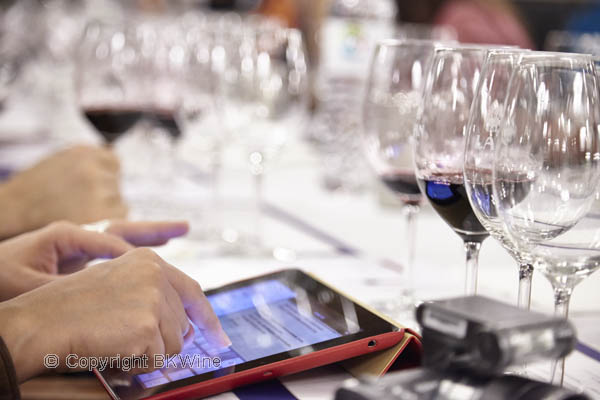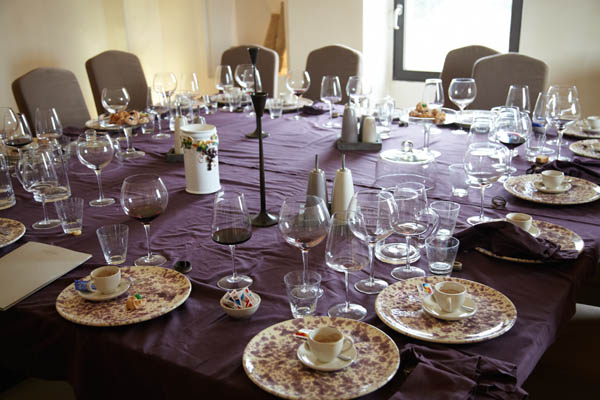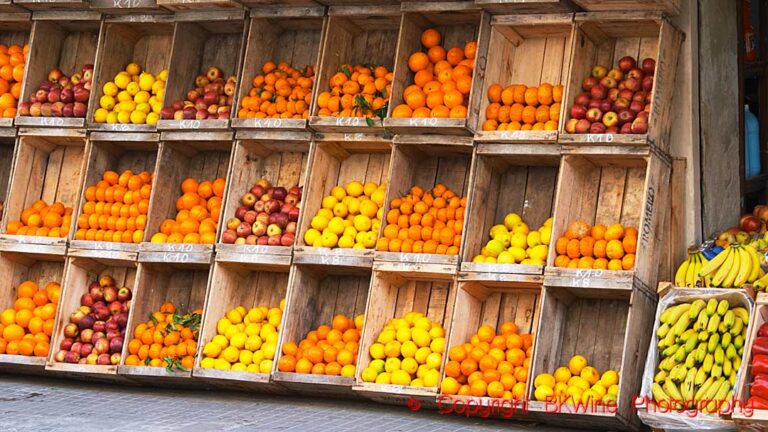Wine blogging, as well as on-line (and off-line in print) wine journalism is changing. Are more and more blog articles just promotional pieces published just because the blogger / journalist has been invited to a tasting or been treated to a trip to a wine region?
It all started with a report that I happened to see on wine blogging. I commented on it on Facebook and the story here will to a large extent be a description of the discussion that ensued on Facebook. (I have edited it quite extensively from the discussion on FB though.)
It started with this that I wrote on Facebook:
‘World Wide Wines: Digital Writing on Wine’ on wine blogging, by the ESC Dijon (a wine business school), directed by Joelle Brouard, and written by Evelyne Resnick, contained quite a few interesting points (although there’s a lot I don’t agree with).
But the very last sentence in the conclusions of the report is just totally off the mark…: “[wine] blogging belongs to the long ideal of the nascent web: a free (financially and intellectually) world.”
Quite the contrary! I have the impression that (even independent) wine blogging is becoming increasingly commercialized or controlled (albeit indirectly) by marketing budgets.
Read more here on the report: https://www.1winedude.com/esc-dijon-bourgogne-wine-blogger-study-2014/
In fact, much of what we see of wine writing online today is going in the other direction from “financially and intellectually free”. I see more and more texts online that looks as if they are promotional pieces rather than journalism. And I am not talking about winery blogs. I am talking about regular independent wine blogs.

The first comment on FB was on the report with some very relevant observations from Alex Prichard, a wine educator and wine writer in Australia:
“A three year study on blogging is totally wide of the mark, in my opinion. What was true three years ago is not true now and what is true now won’t be true in three years. Indeed, the excerpt Joe [the blogger who originally wrote on the report] uses from the final page notes that: “Blogging underwent a lot of changes even in the three short years the study lasted” but that misses the point that on the interwebz three years is practically a lifetime.
Pinterest launched in 2010, Instagram towards the end of 2010 and as bloggers rarely interact with their readers via just the one platform by the time the study ended there’s two ways in which bloggers would have started to change. Not to mention the even more recent explosion smart phone apps.
While I think that understanding blogging and how it works and why bloggers blog is quite an interesting and useful thing to do (particularly if you’re a marketer) doing a three year study is kind of pointless, unless you’re treating it as a retrospective.
And I agree with you about the increasingly commercial nature of wine blogging. I do think it trails some other genres (food blogging, beauty blogging) but it’s definitely heading that way – which is really what will happen with anything as it becomes more mainstream.”
I certainly agree with those points.
And then I continue with the gist of the issue:
One of the things that are worrying is how more and more wine blogging seems to be just wine marketing in disguise.
Not necessarily so that the writers (bloggers, journalists) are doing writing “promotional pieces” intentionally. Only that more and more wine blogs are “fed” by marketing money.
For instance:
On one side you have comments like:
“Look, wine blogging is getting more and more influential. More and more wine bloggers are invited to press tastings and press trips. Some can even get paid for what they write.”
On the other hand: More and more writing on wine blogs are (or seem to be) texts celebrating this or that wine region or wine producer, just simply because (or so it seems) the writer has been given the opportunity to go there on an all-expenses-paid “press trip”. So more and more articles on wine blogs are generated from marketing budgets. Typically without the reader being aware of it. And perhaps the writer is not quite aware of it either.
This is a tricky situation and it is NOT solved by the magic “disclosure“.
Perhaps good old journalistic ethics and editorial control was not so bad after all…?
This brought up a question from Elisabetta Tosi, who is both a wine writer who has written much both in print and online, as well as a wine marketing person. She is one of the persons behind the Italian wine marketing consultancy Fermenti Digitali:
“Do you think that organizing a wine tour [for bloggers] in some region / to some winery can be seen as trying do some sort of ‘corruption’, to force wine bloggers to write about it? When I was writing for wine magazines (now dead and buried) I attended some of those educational tours. I never wrote enthusiastically, and never wrote if the thing didn’t interest me. As a wine blogger I’m doing the same.
Is there something wrong in this?”
Very good questions!
Are you as a wine writer / wine blogger becoming corrupt by accepting free perks like travel? Or simply free samples of wine?
Are marketing people who invite writers / bloggers to this kind of things trying to “exercise undue influence” over what is written (=”corrupting”)?
Is the writing, the texts that come out of it, then just (undisclosed) editorial marketing?
No, there is absolutely not anything wrong in that, in itself.
In fact, without marketing budgets wine writing would mostly disappear. No one – blogger or journalist or magazine – has the budget to do independent research today. Perhaps you have read Simon Woolf’s comment earlier today [another discussion on Facebook] on that his just-published very first article in Decanter in reality cost him some £1000 to make even though he was quite well paid (in wine writer’s terms) for the text. (NB: this is not a straight forward calculation; it depends, for example, on if you account for time etc. But it goes to show that wine writing is certainly not well paid.) And also, I have seen print magazine writers more “corrupt” than any wine blogger that I have ever met. So in reality, this is not specifically a blogger question.

It is nevertheless a very important question both for the writer and for the reader.
It is an eternal dilemma. A writer needs to be independent, or at least should be. Otherwise he is not a writer / blogger / journalist but a marketing communications person. (But it can in some cases be very difficult to tell the difference!)
At the same time, wine writers (including journalists, bloggers, critics and everyone else) are dependent marketing budgets. Without marketing budgets they cannot function.
So it is a difficult balance. It is a balance where a fair and honest equilibrium must be found. Fair and honest above all to the reader!
The wine blogger or wine writer / journalist has to be careful with what he does.
Writers have to be careful and honest and ethical.
You must not write something up in plenty of positive words just because you were lavishly treated to a dinner. Marketing events like the one I described recently in an article: Why does champagne cost so much? should make you think about this. Or write some praising article just because you had a nice trip to some faraway place.
Instead you should write honestly and be aware of the conflicts of interest. A wine writer’s / wine blogger’s first responsibility is towards his READER, not to himself (e.g. to get nice perks) nor to those holding the strings of the marketing budget purse (e.g. because they paid your expensed and treated you nicely).
The case is, in a way, the same for the wine marketing people. They have to know and understand what they are doing and why.
Wine marketing people need to be aware of the same thing, the same conflicts of interest. And they certainly should not be thinking or saying “now I have spent this budget on you [wine blogger] so now I expect you to write something nice about our wines/our wine region“. Yes, that kind of approach is certainly a reality in some cases, sometimes very subtly sometimes very explicitly.
A wine marketing person may spend a lot of budget and get nothing for it. But that has to be expected. “I know that half of my advertising dollars are wasted … I just don’t know which half.” More on this wasted half of the marketing budget here.
The situation is not easy to deal with.
But I do think there is plenty of space for more ethics and more honesty both in print and on wine blogs. Call me naive if you want….
So are wine bloggers just a marketing megaphone, an outlet for marketing budgets to distribute the message?
Sometimes yes. Mostly, hopefully, no.

On a more personal note, on what we do, Britt and me at BKWine; we are perhaps fortunate, more fortunate than most writers / bloggers in some ways. A big part of our activity is organising wine tours. In that business we organise around 30 wine tours every year to wine regions all over the world. That means that we visit some 300 wineries every year. On our own budget. Wineries that we choose ourselves. No marketing budgets involved. We’re lucky.
Conclusions for the wine blogger / journalist: You have to accept that marketing budgets are important for your work. But you also have to decide not to be controlled by marketing budgets. You must be aware of the conflicts of interests, and the conflict between your position and the marketing budget’s position. Don’t write nice things just because you had (or might get) a perk. (Or, increasingly, because someone puts advertising on your site.) Think of the ethics of what you are doing. Above all, keep in mind, your primary responsibility is to your reader. Write honestly and truthfully.
Conclusions for the person holding the marketing budget: Accept that half of your marketing budget will be wasted. Keep in mind the conflict of interest between writers and marketeers, their job is not the same as yours. They’re not an extension of your organisation. And don’t, don’t, have the attitude “I pay for this so now I expect you to write what I want”.
Conclusions for the reader: You have to have a critical eye. Sometimes you need even to be a bit cynical. And ask yourself how and why this piece was written. But most of all you have to be selective in whose texts you read and trust.
What do you think?










9 Responses
I really think your last point is so salient – the reader must always have a critical eye.
Ultimately, it’s almost impossible for someone to write a completely unbiased piece. For example, I had a wine/travel piece published earlier this year that was completely self funded. Like your Simon Woolf example – I was paid well for the finished product but it definitely cost me more to put together than I was paid. However, I’d also been commissioned to write the piece before I left Australia – just the act of commissioning the piece effectively ensured that there would be some positive words written.
Wines featured in magazines/newspapers are very often tied to advertising so the wine reviewer might have very little say in the wines he/she reviews. So while editorial control offers some kind of check and balance it’s not the be all and end all.
I agree that disclosure is not the panacea but perhaps it is the best we have …
Alex,
I use to think that “disclosure” was actually pointless. If the writer is honest and ethical it does not matter if the wine or the trip was free. The writer will write honestly about it in any case, so disclosure becomes pointless. What difference could it make? If there is a disclosure, is the reader supposed to think “this article written by XXX is not worthy of my trust since there is a disclosure, but this other article where he has not had a reason to put a disclosure is trustworthy”? That does not sound reasonable.
Now I am not so sure. Perhaps it is good simply because it alerts the reader to the general realities of the world…
“Accept that half of your marketing budget will be wasted.”
This is a ridiculous statement. If you are doing your job it will not be wasted. Nor should you accept that people who spend a week visiting a region with you will not create content if the mood doesn’t strike them.
We are not talking about nuclear weapons here. Wine is a luxury item and there is plenty to be said on a trip about a place, via Twitter, FB, Instagram or your site/blog. No you do not need to be 100% positive, but if you the journalist think that you can take a trip from a marketing budget to explore, learn, taste and discover a country/region/winery without giving back something, privately or publicly then you are less than professional. Where does this money come from? Wineries. If the trip is shit, and nothing good is shown or done at all, and the whole time you are tasting wines that taste like crap, you have a duty to say that, or give feedback to the trip organizer that will help them in the future.
But in the end the person/group organizing it are not the ones paying the money, it’s the wineries who have faith that their taxes/budgets will be spent well. This doesn’t always happen but the wineries should not expect to lose half of their budget upfront.
I really get sick of people thinking that wine is so important to the world that we can’t talk about a region subjectively and still be respected.
I respect more: Terry Theise, Randall Grahm, Dirk Neipoort, and hundreds of other very biased individuals than I do many writers who think that wine is some sort of life or death conversation. I want passionate biased wine lovers to tell me stories that make them fall in love with their muses.
We need more passion. More subjectivity. Robert Parker as we know is highly subjective in his tastes(whether he agrees or not, the points show bias to certain styles) and I trust him on his biases. Admitting they exist would make him a stronger critic IMHO. It’s OK. And if he takes money from a winery to give a higher score he should be called out and admonished, but if he did that he would lose all his credibility. It’s happened to lesser
Marketing budgets pay the writers directly, sometimest via a publication like Decanter or via a banner ad(something that is disappearing). They pay to bring wine educators to regions to learn about wines and winemaking. They pay to make events like ours(DWCC) and all others(LIWF, Wine Awards, Symposiums) to happen. They pay to give experiences that help the writers be more rounded individuals. We should be thanking these budgets and helping them to be more effective in their efforts to create a better wine buying public.
Marketing budgets are not evil. They are why the wine industry has a life pulse.
Please stop demonizing them.
Ryan,
Thanks for your comments.
However, if you think that I am demonising marketing budgets, then you have not read what I have written, or at least not understood what I have said.
I have worked with marketing a good part of my life. I would not have done that if I thought it was bad.
As I mentioned, without marketing budgets most of wine writing would disappear.
Nevertheless, my impression is that our viewpoints are somewhat different. Mine is that the primary responsibility of a wine writer / blogger is towards his reader, not towards the one who pays the money for the wine or for the travel.
There is an inherent conflict in this, which is the subject of the article.
Everyone who writes on wine (or any other matter by the way) must keep that in mind and decide how to deal with it. If you refuse to acknowledge this conflict you will not be a good wine writer.
I quoted you: “Accept that half of your marketing budget will be wasted.”
This is a statement that shows A) Poor research or B) A dangerous ignorance.
I can’t believe knowing you, that you would allow such rubbish to be allowed on your site. You and I know this is a crap statement.
Yes journalists need to be clear about what they are doing. But seriously what is the role of a wine journalist, one taking notes? Of course they need readers to gain traction to grow as a site so the reader will ALWAYS come first. I can sell out all I want but if I lose readers I won’t be able to sell out, nor will I make money.
The first responsibility is to yourself. Second to your readers and the Wine trade. I don’t see one above the other.
Wine is a luxury good that is also tied to emotion. If you take a free trip or get samples I could give a damn. In fact a recent survey in the USA(I know we are in Europe) pointed out that most people had no interest in knowing if the products reviewed were samples. Most of them assumed they were.
Most readers know you need to look at the reviewer and judge them against their reviews.
I never said you were demonizing marketing, but a statement like “Accept that half of your marketing budget will be wasted.” – Cannot be taken seriously.
Ah, Ryan, perhaps “them” in “Please stop demonizing them” did not refer to marketeers or marketing budgets, as I understood it. My mistake then. So who is it that I am “demonizing”?
Critique or reporting is by definition subjective, especially about wine. But if you let your writing be overly much guided by who pays your trips or who sends you wine samples then you have renounced on the subjectivity. Then you are just repeating someone else’s message. Loosing the subjectivity is exactly what happens when blogging/journalism looses its independence towards marketing budgets.
And on knowing which half of your marketing budget that is wasted, surely you must understand that it is a jocular and simplified statement?
But if you really do think that you are capable of evaluating exactly what is effective in someone’s marketing activity then you are in the wrong business. You should start a marketing consultancy. You would become very rich. That is one of the differences between sales and marketing. Sales is easy to measure. Marketing is on the other hand very difficult to measure the effectiveness of. You can try. In fact you should try. Otherwise you will be 100% in the dark. But if you think that you can really identify which “50% is wasted” then I think you are wrong. Why do you have such a hard time convincing wineries to spend marketing resources on the internet and social media?
You say “are you being corrupted” by accepting the press trips and other free bits. I say not. For one without the press trips I would never be able to afford or organise such a trip on my own. And for two – its about the wine. If you love wine, in all its varied forms, how can you not like and be inspired by exploring a wine region?
Andrew,
I agree with you that there is nothing wrong with press trips (FAM trips) and other paid-for events.
Most wine writers and journalist (including bloggers of course) would not survive without it. It is an integral and important part of how this business works and there is nothing fundamentally wrong with it. Actually, I see it mainly as a good thing, and not negative at all.
(Otherwise the only ones who would be writing about wine would be the ‘independently wealthy’ and I don’t think that would be an improvement.)
The issue though, is how it is handled, but by the organisers and by the writer.
An attitude from the purse holder of “I’ve paid good money for you to do this [trip/tasting/…] so now I certainly expect that you will write it up for me in” (no need to state explicitly “in a nice way”…), or from the person holding the pen of “they’ve spent money on me doing this so now I’d better write something about it, and something nice it’d better be too”, are questionable.
When you go down that route you are approaching what is called marketing copy or promotional writing, not journalism or independent wine writing.
Both types of text are good and have a raison d’etre, but it should be clear what is what. It is when one is masquerading as the other that it becomes an issue.
“both by the organisers and by the writer” it should be.